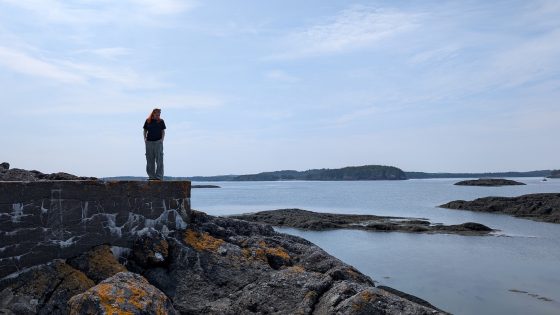Blog Contributor: Ruth Horn

Before touring the Cairns building, I’ll admit that I didn’t know what LEED certification really meant. I had heard the term before, but I couldn’t have explained what made a building “green” beyond maybe using less energy or recycling more. Walking through Cairns completely shifted that understanding. I realized that sustainability in architecture is far more complex and intentional than I ever imagined. It’s about designing every detail to serve a purpose for people, the planet, and even long-term economics.
What impressed me right away was how the building integrates environmental and social sustainability together. For example, the overhangs and angled glass walls aren’t just aesthetic, they’re also designed to control light and heat, reducing the need for extra cooling while still making the space bright and inviting. Even something as simple as the main staircase was planned to encourage active living by drawing people to use it instead of the elevator. I’d never considered that architecture could influence behavior like that, but it made me see sustainability as something that connects to daily life, not just big systems.
The technical parts of the tour were really interesting as well. The system that circulates air through the concrete floors to regulate temperature was something I never would have thought existed. It made me realize that sustainability can be incredibly innovative. It’s also about using the structure itself as a living system to save energy. I also found the huge fresh-air intake cool. I hadn’t thought about how buildings that include labs need 100% fresh air, or how that can be balanced with energy efficiency. The solutions built into Cairns showed that sustainability doesn’t mean sacrificing safety or performance. It’s about finding smart ways to meet both needs.
The containment labs were another example of that balance. Hearing about the specialized materials, the hydrogen chloride-resistant caulking, and the acid-neutralizing glass pipes showed me how seriously safety and long-term durability are considered. It was also surprising to learn that the building uses a central steam plant and reverse osmosis water for temperature and humidity control. Every system seemed to be part of a bigger, connected network.
One of the most unexpected things I learned was how much behaviour matters. The example of fume hoods left open wasting energy really stuck with me. It made me think about how even the most advanced sustainable building still relies on people making conscious choices.
Overall, this tour turned sustainability from an abstract idea into something tangible and exciting. I came away seeing it as both an art and a science. It’s something that requires creativity, collaboration, and constant problem-solving. It also made me curious to keep learning, because I can now see how sustainability connects to almost everything: design, technology, health, and the way we live every day.







































